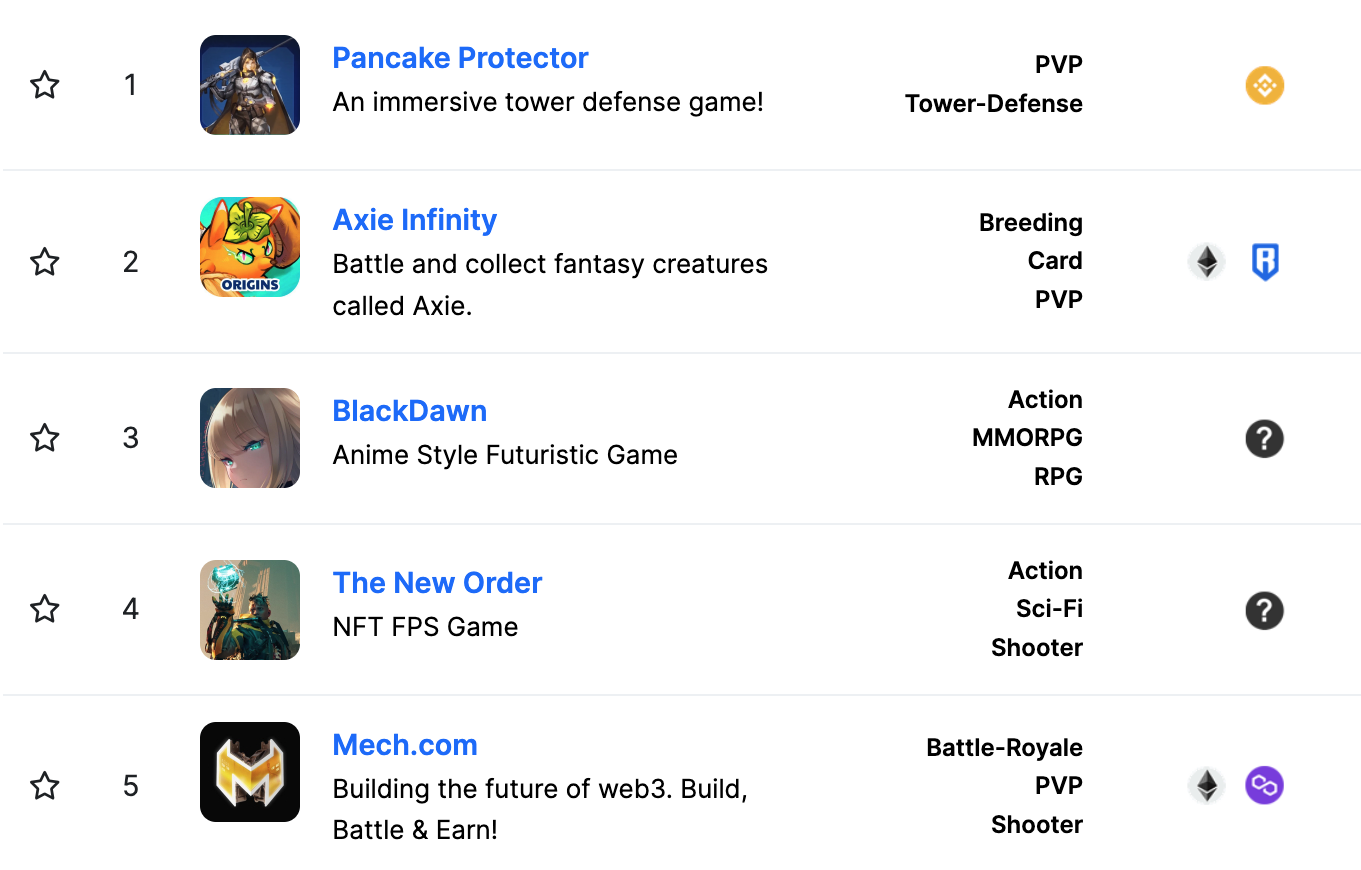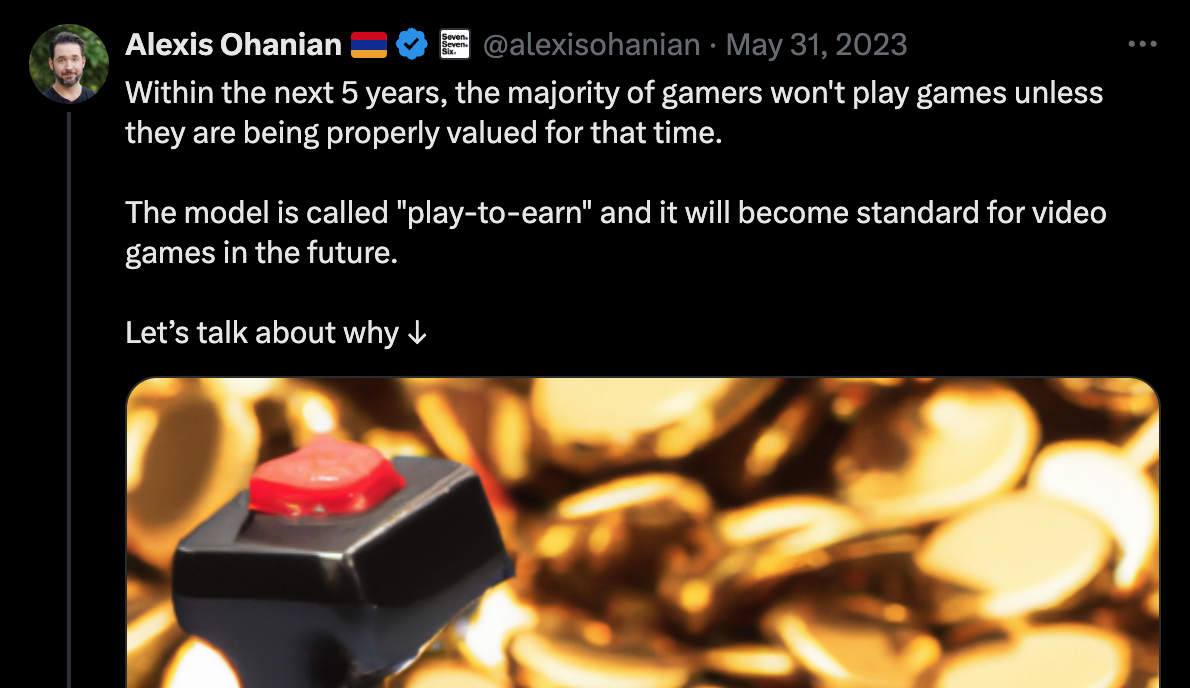The bankruptcy of "play-to-x" gaming
I originally wrote this post in mid-2023, after an especially loathsome tweet by Alexis Ohanian predicting that within "the next 5 years, the majority of gamers won't play games unless they are being properly valued for that time." Almost a year later, even the VCs that haven't pivoted to AI seem to have cooled on the idea, at least for now. Nevertheless, "play-to-x" gaming is an ugly idea that deserves an ugly death, and here we will examine why it's doomed to receive one.
Gaming is one of many industries for which crypto hopes it's the solution. The ambitions of web3 game developers have grown considerably since the space's prototypal beginnings with CryptoKitties. While NFT collectibles appear to remain dominant, every conceivable genre has seen multiple web3 entrants over the past 5 years.

https://playtoearn.net/blockchaingames retrieved 2024-05-18
Despite these persistent attempts, web3 gaming remains a fringe activity in both gaming and web3. Many factors contributed to this status quo, perhaps none more so than the insistence on "play-to-earn" and "play-to-own" models among web3 game developers. To be sure, most web3 games are boring, buggy, or hideous. Any one of these flaws can be sufficient for a game to fail. But even if they were made fun; even if the usability issues were fixed; and even if their aesthetics exuded sincerity and warmth, a game with a "play-to-x" model is doomed to fail. Specifically, it is impossible for a play-to-x game to succeed, because it is not a game, but a contradiction in terms.
To understand why this is the case, we need to establish what a game is. In game design, the Mechanics-Dynamics-Aesthetics (MDA) framework is a well-known tool for analyzing games. In brief:
- A game contains a set of mechanics.
- The mechanics create certain dynamics when interacted with by the player.
- The dynamics create a certain aesthetic experience for the player, evoking an emotional response.
For example, in the first-person shooter Counter-Strike:
- The game takes place over timed rounds, with players split into two teams. In the most common format, one team defends some objective that the other team is attacking. Players win by accomplishing their team's objective before the time runs out, or by killing everyone on the opposing team.
- This creates fast-paced rounds where players need to cooperate and act quickly in order to succeed.
- This demands a high degree of concentration from players, and creates a tight feedback loop as players attempt to improve on their performance each round.
Now, why do people play Counter-Strike? Fundamentally, for one reason only: because they enjoy it. In MDA terms, the aesthetics, i.e. emotional response in the player is what matters. The mechanics and dynamics only exist to facilitate an enjoyable experience. People find different kinds of experiences enjoyable, which explains the existence of game genres. Counter-Strike is a remarkably successful entry in its genre, multiplayer first-person shooters, which is why on average over 900,000 people were playing the latest version at any moment in April, 2024.[1] For the the overwhelming majority of those people, they receive no reward for playing other than the experience of doing so; gaming, like any form of play, is an end unto itself.
Proponents of play-to-x do not ask how web3 features will improve the experience of playing games. Rather, play-to-earn focuses on "properly compensating" the player for their time, and play-to-own on letting the player possess ingame assets in the real world. Both models completely disregard the key value proposition of games—they are fun to play—and try to sell players on something they neither need nor want. The absurdity of this becomes clear if you imagine making similar propositions to other media consumers, such as book readers, TV watchers, or concertgoers. Them and players both are willingly paying to engage in their chosen activity. Play-to-x proposes to pay people for something they are themselves paying for the privilege of doing—a kind of economical derangement—or to let them own some fraction of the content that cannot be enjoyed on its own. It would be no less delusional to try to "properly compensate" couples for having sex.
Even if play-to-x was not on its face absurd, its case also unravels if we examine it as a tool of game design. Let's forget about the "play-to" framing, and consider monetary compensation and real-world asset ownership as game mechanics. Although ownership provides no direct remuneration for playing, it still creates financial incentives through the possibility of exchanging your ingame assets for money. Returning to the MDA framework, direct remuneration (usually through fungible tokens) and ownership (usually through NFTs) are both mechanics that introduce real-world financial incentives as an ingame dynamic. It's in these incentives that we find the ultimate irreconcilability of play-to-x and gaming.
For as long as there have been MMOs, there have been people who have sold ingame items for real-world currency. In almost every case, this behavior is met with outrage by players, and swift corrective action by the developers. Why? Because financial incentives fundamentally alter the behavior of players. To reiterate, people play games not necessarily to "win", but to have an enjoyable experience. Open-ended MMOs like EVE Online illustrate this well, as its players engage with the game in a great variety of ways. Critically, they do so on the terms of the game, and for the sake of their enjoyment. The moment financial incentives are introduced, players stop engaging with the game on its own terms, and the pursuit of profit becomes paramount. In EVE, for example, "real money traders" frenetically procure ingame assets to the exclusion of all else, and transfer those assets to buyers at zero ingame cost, thereby disrupting the ingame economy.[2]
When financial incentives are introduced to a game, there are two possible long-term outcomes: either the expected returns are too low to alter anyone's behavior, or they turn the game into the preferred economic activity of some its players; the game becomes a job. Since players currently receive no remuneration, we must conclude that they are intentionally avoiding profit-seeking behavior while they are playing. And indeed, what is gaming if not—like any recreational activity—a relief from the stresses of daily life, and in particular those associated with economic competition?

https://x.com/alexisohanian/status/1663923368557420550 retrieved 2024-05-18
Degens and crypto VCs with play-to-x games in their portfolio apparently have a hard time appreciating this fact. In the latter category, Alexis Ohanian recently tweeted that we should expect that within "the next 5 years, the majority of gamers won't play games unless they are being properly valued for that time." I'm sure the partners and investors of SevenSevenSix would love to think that, particularly if none of the interstellar mining companies in their portfolio pan out during that timeframe.[3]
I don't mean to be too harsh on Ohanian here; at least interstellar mining will turn a profit in somebody's lifetime. And the impulse to "decentralize" gaming is understandable from the perspective of everyone except the (extremely centralized) incumbents. Business practices like gratuitous live service requirements erode the ownership rights of games allegedly purchased for cash. Perhaps there is a way to use web3 to create a game that is ultimately owned or controlled by its players. But, like any game, it will fail or succeed on its merits as a game, not as an economic activity.
-
https://steamcharts.com/app/730 retrieved 2024-05-18 ↩︎
-
https://www.eveonline.com/news/view/real-money-trading-is-bad-mkay retrieved 2023-08-09 ↩︎
-
As of 2024-05-18, the SevenSevenSix portfolio companies hoping to exploit the riches of space would appear to be interlune and AstroForge. ↩︎